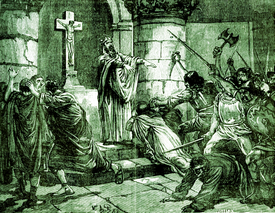Lives of the Saints
Our Models and Protectors
Spiritual Bouquet:
July 13

Saint Eugenius
Bishop of Carthage
(† 505)
In the year 481, the episcopal see of Carthage had been vacant for twenty-four years, when Huneric, barbarian King of the African Vandals, decided to allow the Catholics to fill it, provided certain conditions be met. The people, impatient to enjoy the consolation which a pastor would bring to the church, chose Eugenius, a citizen of Carthage, eminent for his learning, zeal, piety and prudence. His charities to the distressed had already been very abundant, and in his new office he refused himself the slightest convenience, in order to be able to give all he had to the poor.
His virtue gained him the respect and esteem even of the Arians; but at length envy and blind zeal overcame their better sentiments, and Huneric sent Saint Eugenius an order never to sit on the episcopal throne, preach to the people, or admit into his chapel any Vandals, even if Catholic. The Saint courageously replied that the laws of God commanded him not to shut the door of His church to any who desired to serve Him there. The Vandal king, enraged at this answer, persecuted the Catholics in various ways. Many nuns were so cruelly tortured that they died on the rack. Great numbers of bishops, priests, deacons, and eminent Catholic laymen were banished to a desert filled with scorpions and venomous serpents. Many also were put to death.
During this persecution the people followed their bishops and priests to execution with lighted tapers in their hands. Mothers carried their little infants in their arms and laid them at the feet of the confessors, crying out with tears, On your way to receiving your crowns, to whom do you leave us? Who will baptize our children? Who will impart to us the benefit of penance, and free us from the bonds of sin by the grace of reconciliation and pardon? Who will bury us with solemn prayers at our death? By whom will the divine Sacrifice be offered?
By the intervention of Providence, Saint Eugenius was liberated on the very scaffold, but exiled to an uninhabited desert in the province of Tripoli and committed to the guard of Anthony, an inhuman Arian bishop. The latter treated him with the utmost barbarity, shutting him up in a narrow cell and allowing no one to visit him. Before entering that prison, however, he had found a way to write to his diocesans a splendid letter, in which he said: If I return to Carthage, I will see you in this life; if I do not return, I will see you in the other. Pray for us and fast, because fasting and almsgiving have always obtained the mercy of God; but remember above all, that it is written we must not fear those who can kill only the body.
When a new king named Gontamund succeeded to Huneric, he recalled Saint Eugenius to Carthage, opened the Catholic churches, and allowed all the exiled clergy to return. After reigning twelve years, Gontamund died, and his brother Thrasimund was called to the crown. Under that prince Saint Eugenius was again banished. He died in exile in France on July 13, 505, in a monastery which he had built and governed, at Albi, near Toulouse. Saint Gregory of Tours assures that many miracles occurred at his sepulchre.
Reflection: Alms shall be a great [source of] confidence before the Most High God, for those who give. Water quenches a flaming fire, and almsgiving opposes sin. (Holy Bible - Tobias 4:12)
Little Pictorial Lives of the Saints, a compilation based on Butler's Lives of the Saints, and other sources by John Gilmary Shea (Benziger Brothers: New York, 1894); Les Petits Bollandistes: Vies des Saints, by Msgr. Paul Guérin (Bloud et Barral: Paris, 1882), Vol. 8